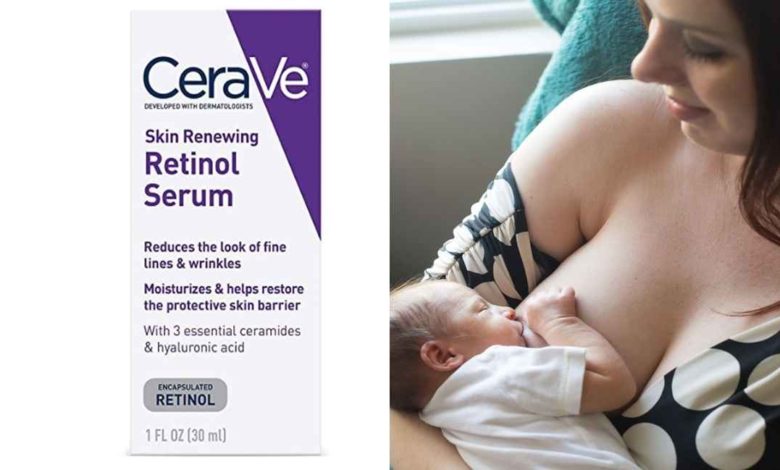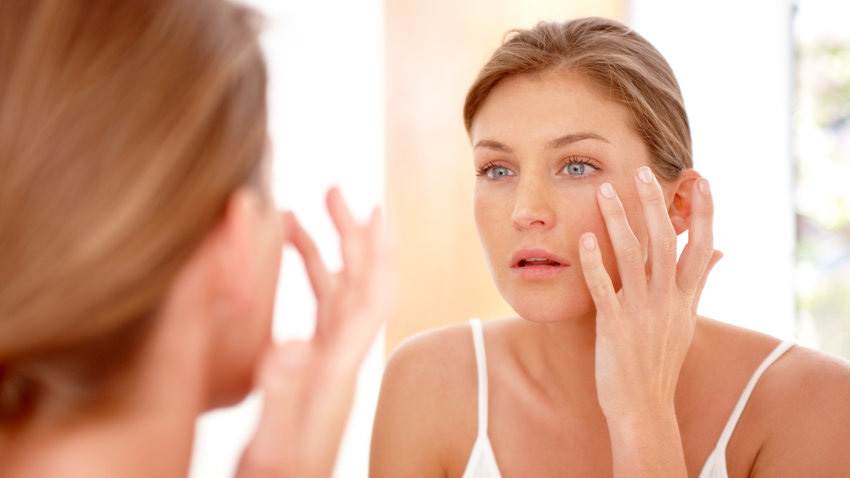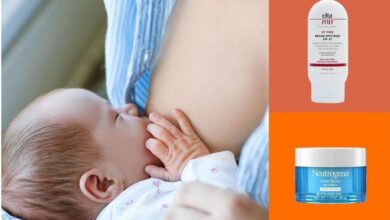Can I Use Retinol While Breastfeeding?

As a breastfeeding mom, there are things you shouldn’t do, take or apply on your skin – especially using retinol while breastfeeding.
Breastfeeding and pregnancy can be overwhelming, they come with challenges that may not give you the needed time to take care of yourself. But, using retinol while breastfeeding isn’t the best idea either.
They are unforeseen effects that rises from using retinol while breastfeeding, this reason alone has prompt most doctors to discourage women on the use of retinol products. Using Retinoid e.g Tretinoin drugs has adverse effect and should be avoided.
Table of Contents
Can Breastfeeding Moms Use Topical Retinol?
It is safer as a breastfeeding mom not to use topical retinol or any skin products that has retinol for the main time, until when you start weaning your baby.
Most dermatologist, warned women especially breastfeeding or pregnant mom to stay away from retinol products, it is believed that Retinoid has harmful effects when passed on to babies through breast-milk.
Applying skincare products with retinol has been believed to be harmful during pregnancy because the substance penetrates the skin into the bloodstream and harm your baby.
Hey, don’t feel defeated! You can still look good, radiant, and beautiful even if you don’t use these skincare products that contains retinol as their active ingredients.
Because you have been told not to use Retinoid doesn’t mean you should neglect your skin beauty regimen. A twenty-first-century woman needs her confidence to function properly in today’s society.
Also Read: 7 Best skincare products safe for breastfeeding
Using Retinol while Breastfeeding – What Experts are Saying?
No study has point out the correlation between retinol and breastfeeding, and the effects it has on babies that are breastfed.
Although, report shows that Retinoid and Retinol have teratogenic effects on the growing fetus inside the womb. The unforeseen effects that could rise from using retinol while breastfeeding and on pregnancy is the reason doctors are more hesitant to advise women on the use of the product.
Therefore, it is important not to take unnecessary risks. Your baby’s life and safety are at stake.
Disclaimer: Before considering using skincare products with retinol while nursing, it is essential to see your doctor for professional advice.
Using Chemical Skin products while Breastfeeding: What Are the Effects
At this stage, there is a great shift from the norm. You can’t use the same beauty product as when you weren’t nursing a baby. Your is skin now very sensitive and changes in texture and even tone.
What works for your skin before may not be what your skin needs during pregnancy or when nursing a baby.

Medical experts have noticed that the use of some skincare products or even your normal skincare products my cause rash or dull completion at this stage. Therefore, a new approach should be taken to give you your glow back.
Chemicals in some products deposit toxins that penetrate the skin into the bloodstream harming the developing fetus.
“They can affect your hormonal cycles and interfere with the production of organs in an unborn baby,” says Dr. Shilpi Agarwal, Board-certified Family, and Medical Consultant.
The same goes for breastfeeding. A baby is always in close contact with their mom.
When there is direct skin contact between a baby and her mother and the toxins from the body lotion on the mother breast can be absorbed by the baby’s skin causing adverse effects on the skin. An example of such effects is rash on the skin.
I encourage you to try your best to protect yourself and your bundle of joy as you go through this stage, as you now know that the smallest form of toxicity from your skincare products can cause great damage to your baby.
Skincare to Avoid While Breastfeeding
1. Hydroxy acids and benzoyl peroxide
Hydroxy acids and benzoyl peroxide are generally not recommended for hypersensitive skin. When fighting acne, clearing pores, and exfoliating dead skin cells these substances have become the gold standard.
Some nursing moms will practically experience extra sensitivity to everything. Therefore, this is bad news for them and those with skin injuries or defects!
2. Salicylic Acid – salicylic acid while breastfeeding
Salicylic acid is believed to cause a defect to fetus in the worm when taken in high dose. Some topical acne-fighting products has about 2% of salicylic acid and are generally safe for child.
However, dermatologists still recommend keeping away from it as high doses appeared to cause birth defects and pregnancy complications.
The most common beta hydroxy acid (BHA) listed as an ingredient to some skincare and health products has shown complications in pregnancy.
3. Retinoids
Retinoids come as the best anti-acne substance for some women; it help in acne treatment and line removal from the face. Retinoid comes in different form and retinol is one of them. using retinol while breastfeeding is not in your best interest as a nursing mom.
Retinoic is an OTC prescription. Birth defects or malfunctions are caused by Retinoid. When trying to conceive, you should cease the intake of Retinoid and all other forms. The most common types of retinoids are listed as follows:
a. Tretinoin (Retin-A, Renova, Stieva-A)
There is minimal absorption of tretinoin containing Retin-A drug via topical sources as cited by Hales Medications and Mothers Milk (2019). Topical tretinoin belongs to category L3 of lactation risk or is fairly safe for breastfeeding.
The FDA has recommended, however, that nursing mothers should avoid using a tretinoin cream called Renova (0.02 percent tretinoin) because it is not clear if this drug finds its way into human milk.
b. Tazarotene (Tazorac, Zorac)
Presently there is no data to determine if this medication can be transferred into breast milk. It is used topically mainly to treat acne and healthy plaques psoriasis.
Dr. Hale mentioned, that the absorption rate increases when applied to a large surface area. The use of this medication should be taken with caution. Consult your doctor about the health implications of using this drug when you are breastfeeding.
c. Adapalene (Differin)
Adapalene is used topically in acne treatment and is similar to tretinoin. Without a prescription, it can be bought over the counter. Regarding its transfer to human milk, there is no available data about it.
McHale states, however, that when added topically to the skin, it is practically unabsorbed, and therefore undetectable in breast milk.
d. Isotretinoin (Accutane, Isotrex, Absorica)
For treating severe acne popular isotretinoin called Absorica is used. Mothers who are breastfeeding should not use the drug during nursing and up to a month after treatment is complete, as it is strongly advised against.
Before considering taking these medicinal products, consult your doctor first.
e. Retinol
Retinol is a less effective prescription-strength to retinoid that falls within the category of non-prescription retinoids. Creams and serums that are formulated to reduce fine lines, dark spots, and wrinkles widely contain retinol. It can improve your skin tone and boost the production of collagen in the skin.
Although the risk of transferring to breast milk is low, however, it’s best to avoid retinol containing products when nursing your baby. No studies have gone to actually determine their safety for a mother who was breastfeeding. However, there are healthier options that can be used, instead of retinol.
3. Essential oils
Essential oils are highly concentrated substances extracted from plants. It is therapeutic, good for your skin when moderately used. However, higher doses are detrimental to your baby’s safety. Therefore, use with caution, if required while pregnant.
4. Chemical sunscreens
When you need a safer sunscreens pick an all-natural option that does not penetrate the skin. A mineral-based sunscreen with zinc is a safer alternative ingredient because it provides a physical barrier against the sun.
Skincare Tips While Breastfeeding
When it comes to breastfeeding, there are many compatible skin care products available. In this segment, we are going look at other skin care treatments that are suitable while breastfeeding. The message to take home is to choose natural products that take care of your skin needs.
Vitamin C
Collagen productions help your skin appear radiant with an even tone; it is improved by Vitamin C or ascorbic acid. Most facial creams and serums have Vitamin C as a common ingredient, this vitamin can also be gotten from citrus fruits and green vegetables.
Drinking water

Dehydration is not only bad for our health, but it is also bad for our skin. Lack of water in our body can make our skin appear dull and flaky. Drink at least 8 glasses of water a day or to thirst to keep your skin moisturized.
Sleep well

In the early weeks of being a new mom, a proper sound sleep seems impossible at times. You look a lot healthier with glowing skin when getting a good night’s sleep. Whenever you get a chance or when your baby is sleeping during the day, take a nap when you have anything shorter than 8 hours of sleep at night.
Oily and Fatty foods
Sometimes, oily foods may seem to be the easier option, but it may cause acne to appear or make you look more aged. Switch to healthier alternatives and prevent oily skin by reducing your intake of fried and fatty foods. With less oil, you can make a tasty meal by Steaming and grilling your food.
Antioxidants
Eating foods and fruits high in antioxidants helps to keep free-radicals away from your skin. Berries such as blueberries, strawberries, and raspberries, etc., contain high levels of antioxidants your body needs to wade off free-radicals.
Cleanse regularly

Looking after your baby leaves you with little or no time to take care of yourself. During breastfeeding, it becomes impossible to carry out your usual skincare regimen. It is important to get your skin cleanse regularly, to maintain healthy skin. As part of your morning and night routine, wash your face with a gentle facewash.
Different Forms of Retinoid and Retinol
You must reconsider your stand with Retinol and breastfeeding. When using retinol while breastfeeding, it is important to know that it’s not the safest thing at this stage. You may have come across brands with retinol in it – I am not going to mention any here for you. But I will only advise you to choose wisely when shopping for skincare products.
To avoid accidental usage, been aware of retinol containing products will help you. Anti-aging and anti-acne products are usually where Retinols are found. For every product, you intend to purchase, always read the label of the product.
Retinoids are seen with the following names;
- Retinol
- Retinoic acid
- Tretinoin (Retin-A and Renova)
- Retinyl linoleate
- Retinyl palmitate
- Adapalene (Differin)
- Tazarotene (Tazorac, Fabior, Zorac, and Avage)
Take Home
I hope you have learned enough and properly informed about retinol and breastfeeding. As a take-home, I want you to know that things can find their way into the milk your baby drinks whether you take them internally and topically.
Therefore, to protect your baby from potential harm, take time to examine all products you use and everything you eat; make sure they don’t contain retinol while breastfeeding.
Like this article? I would be happy if you share or pin it for some other time. You can also stay in touch and follow us on Facebook, or Pinterest
DISCLAIMER – The information on this post is for educational purposes only and should not be construed as a substitute for advice from a medical professional or health care provider.







